NUIST-OOP-Lab02
🧪 实验报告
一、实验名称
现代C++编程初体验
二、实验目的
- 加深对OOP概念(类、对象)和特性(封装)的理解
- 会用C++正确定义、实现、测试类;会创建对象,并基于对象编程
- 加深对C++内存资源管理技术的理解,能够解释构造函数、析构函数的用途,分析它们何时会被调用
- 会用多文件方式组织代码
- 针对具体问题场景,练习运用面向对象思维设计,合理利用C++语言特性(封装与访问权限控制, static, friend,const),在数据共享和保护之间达到平衡
三、实验环境
| 项目 | 内容 |
|---|---|
| 操作系统 | Ubuntu24.04 |
| 编译器/IDE | g++13.3.0, clang13.3.0 |
| 编辑器 | cursor, fish |
| 实验日期 | 25/10/2025 |
四、实验内容与步骤
实验任务1
- 源码与运行测试截图
[!WARNING]
乱码警告,出现乱码的原因见末尾解释
#pragma once
#include <string>
// ��T: ����
class T {
// �������ԡ�����
public:
T(int x = 0, int y = 0); // ��ͨ���캯��
T(const T &t); // ���ƹ��캯��
T(T &&t); // �ƶ����캯��
~T(); // ��������
void adjust(int ratio); // ��ϵ���ɱ���������
void display() const; // ��(m1, m2)��ʽ��ʾT�������Ϣ
private:
int m1, m2;
// �����ԡ�����
public:
static int get_cnt(); // ��ʾ��ǰT���������
public:
static const std::string doc; // ��T��������Ϣ
static const int max_cnt; // ��T��������
private:
static int cnt; // ��ǰT�������Ŀ
// ��T��Ԫ��������
friend void func();
};
// ��ͨ��������
void func();
int T::get_cnt() {
return cnt;
}
// T.cpp
#include "T.h"
#include <iostream>
#include <string>
// ��Tʵ��
// static��Ա���������ʼ��
const std::string T::doc{"a simple class sample"};
const int T::max_cnt = 999;
int T::cnt = 0;
// ���
// int T::get_cnt() {
// return cnt;
// }
// ����
T::T(int x, int y): m1{x}, m2{y} {
++cnt;
std::cout << "T constructor called.\n";
}
T::T(const T &t): m1{t.m1}, m2{t.m2} {
++cnt;
std::cout << "T copy constructor called.\n";
}
T::T(T &&t): m1{t.m1}, m2{t.m2} {
++cnt;
std::cout << "T move constructor called.\n";
}
T::~T() {
--cnt;
std::cout << "T destructor called.\n";
}
void T::adjust(int ratio) {
m1 *= ratio;
m2 *= ratio;
}
void T::display() const {
std::cout << "(" << m1 << ", " << m2 << ")" ;
}
// ��ͨ����ʵ��
void func() {
T t5(42);
t5.m2 = 2049;
std::cout << "t5 = "; t5.display(); std::cout << '\n';
}
#include "T.h"
#include <iostream>
void test_T();
int main() {
std::cout << "test Class T: \n";
test_T();
std::cout << "\ntest friend func: \n";
func();
}
void test_T() {
using std::cout;
using std::endl;
cout << "T info: " << T::doc << endl;
cout << "T objects'max count: " << T::max_cnt << endl;
cout << "T objects'current count: " << T::get_cnt() << endl << endl;
T t1;
cout << "t1 = "; t1.display(); cout << endl;
T t2(3, 4);
cout << "t2 = "; t2.display(); cout << endl;
T t3(t2);
t3.adjust(2);
cout << "t3 = "; t3.display(); cout << endl;
T t4(std::move(t2));
cout << "t4 = "; t4.display(); cout << endl;
cout << "test: T objects'current count: " << T::get_cnt() << endl;
}
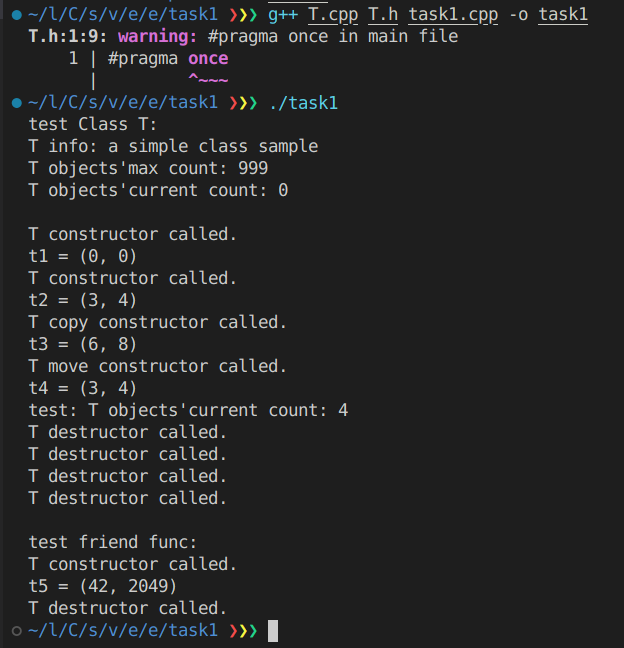
- 问题
-
不能:
![截图 2025-10-22 08-07-33]()
-
普通构造函数在手动创建对象并初始化的时候使用,复制构造函数在通过已有对象创建对象的时候使用,移动构造函数在使用move语义的时候使用,析构函数根据RAII在对象生命周期结束的时候自动调用
-
![截图 2025-10-25 14-39-31]()
静态变量只能在一个.cpp文件中定义一次,如果在头文件中对静态变量进行初始化,被包含时每个.cpp文件都会生成自己的静态变量定义,链接器发现同名变量出现多次从而报重定义链接错误
-
实验任务2
- 源码与运行测试截图
#include <string>
class Complex
{
private:
double real;
double imag;
friend void output(const Complex &x);
friend double abs(const Complex &x);
friend Complex add(const Complex &a, const Complex &b);
friend bool is_equal(const Complex &a, const Complex &b);
friend bool is_not_equal(const Complex &a, const Complex &b);
public:
static const std::string doc;
Complex(double real = 0.0, double imag = 0.0);
Complex(const Complex &x);
Complex(Complex &&x);
Complex &operator=(const Complex &) = default;
~Complex();
void add(const Complex &x) {
real += x.get_real();
imag += x.get_imag();
}
double get_real() const {
return real;
}
double get_imag() const {
return imag;
}
};
void output(const Complex &x);
double abs(const Complex &x);
Complex add(const Complex &a, const Complex &b);
bool is_equal(const Complex &a, const Complex &b);
bool is_not_equal(const Complex &a, const Complex &b);
#include "complex.h"
#include <iostream>
#include <cmath>
const std::string Complex::doc{"a simple complex class"};
Complex::Complex(double r, double i): real{r}, imag{i} {
std::cout << "comstructor called." << std::endl;
}
Complex::Complex(const Complex &x): real{x.real}, imag{x.imag} {
std::cout << "compy comstructor called." << std::endl;
}
Complex::Complex(Complex &&x): real{x.real}, imag{x.imag} {
std::cout << "move constructor called." << std::endl;
}
Complex::~Complex() {
std::cout << "destructor called." << std::endl;
}
void output(const Complex &x)
{
std::cout << x.real;
if (x.imag >= 0) std::cout << " + ";
else std::cout << " - ";
std::cout << abs(x.imag) << "i";
}
double abs(const Complex &x)
{
return sqrt(x.get_real() * x.get_real() + x.get_imag() * x.get_imag());
}
Complex add(const Complex &a, const Complex &b)
{
return Complex(a.get_real() + b.get_real(), a.get_imag() + b.get_imag());
}
bool is_equal(const Complex &a, const Complex &b)
{
return a.get_real() == b.get_real() && a.get_imag() == b.get_imag();
}
bool is_not_equal(const Complex &a, const Complex &b)
{
return a.get_real() != b.get_real() || a.get_imag() != b.get_imag();
}
// ������ͷ�ļ�
// xxx
#include "complex.h"
#include <iostream>
#include <iomanip>
#include <complex>
void test_Complex();
void test_std_complex();
int main() {
std::cout << "*******����1: �Զ�����Complex*******\n";
test_Complex();
std::cout << "\n*******����2: ����ģ����complex*******\n";
test_std_complex();
}
void test_Complex() {
using std::cout;
using std::endl;
using std::boolalpha;
cout << "���Ա����: " << endl;
cout << Complex::doc << endl << endl;
cout << "Complex�������: " << endl;
Complex c1;
Complex c2(3, -4);
Complex c3(c2);
Complex c4 = c2;
const Complex c5(3.5);
cout << "c1 = "; output(c1); cout << endl;
cout << "c2 = "; output(c2); cout << endl;
cout << "c3 = "; output(c3); cout << endl;
cout << "c4 = "; output(c4); cout << endl;
cout << "c5.real = " << c5.get_real()
<< ", c5.imag = " << c5.get_imag() << endl << endl;
cout << "�����������: " << endl;
cout << "abs(c2) = " << abs(c2) << endl;
c1.add(c2);
cout << "c1 += c2, c1 = "; output(c1); cout << endl;
cout << boolalpha;
cout << "c1 == c2 : " << is_equal(c1, c2) << endl;
cout << "c1 != c2 : " << is_not_equal(c1, c2) << endl;
c4 = add(c2, c3);
cout << "c4 = c2 + c3, c4 = "; output(c4); cout << endl;
}
void test_std_complex() {
using std::cout;
using std::endl;
using std::boolalpha;
cout << "std::complex<double>�������: " << endl;
std::complex<double> c1;
std::complex<double> c2(3, -4);
std::complex<double> c3(c2);
std::complex<double> c4 = c2;
const std::complex<double> c5(3.5);
cout << "c1 = " << c1 << endl;
cout << "c2 = " << c2 << endl;
cout << "c3 = " << c3 << endl;
cout << "c4 = " << c4 << endl;
cout << "c5.real = " << c5.real()
<< ", c5.imag = " << c5.imag() << endl << endl;
cout << "�����������: " << endl;
cout << "abs(c2) = " << abs(c2) << endl;
c1 += c2;
cout << "c1 += c2, c1 = " << c1 << endl;
cout << boolalpha;
cout << "c1 == c2 : " << (c1 == c2)<< endl;
cout << "c1 != c2 : " << (c1 != c2) << endl;
c4 = c2 + c3;
cout << "c4 = c2 + c3, c4 = " << c4 << endl;
}
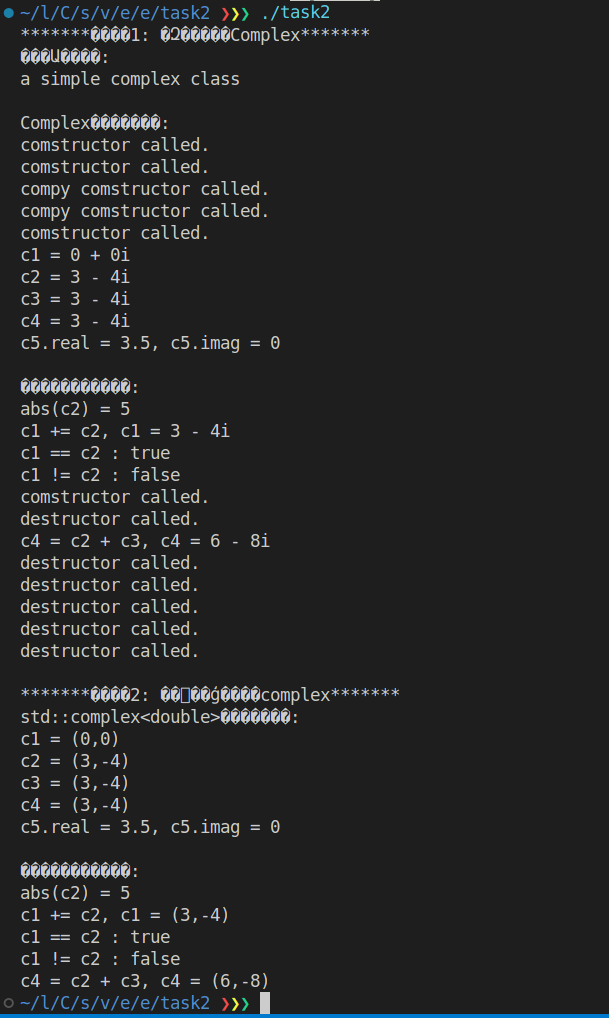
- 问题
- 右边更加简洁,更符合cpp的语法,运算其实是通过操作符函数来进行的,标准库在类中重载了操作符函数,从而达到这个效果
- 其实不用,因为已经在complex中提供了访问这两个数据的安全接口,所以更应该通过接口对私有数据进行访问,这样更加安全
std::complex并没有将abs作为自己的友元- 类友元发生在两个类的实现紧密耦合的时候;操作符重载时可能也要,就是类外逻辑
- 右边更加简洁,更符合cpp的语法,运算其实是通过操作符函数来进行的,标准库在类中重载了操作符函数,从而达到这个效果
实验任务3
- 源码与运行测试截图
#pragma once
#include <string>
enum class ControlType {Play, Pause, Next, Prev, Stop, Unknown};
class PlayerControl {
public:
PlayerControl();
ControlType parse(const std::string& control_str); // ʵ��std::string --> ControlTypeת��
void execute(ControlType cmd) const; // ִ�п��Ʋ������Դ�ӡ���ģ�⣩
static int get_cnt();
private:
static int total_cnt;
};
#include "PlayerControl.h"
#include <iostream>
#include <algorithm>
int PlayerControl::total_cnt = 0;
PlayerControl::PlayerControl() {}
// ������
// 1. �������ַ���תΪСд��ʵ�ִ�Сд������
// 2. ƥ��"play"/"pause"/"next"/"prev"/"stop"�����ض�Ӧö��
// 3. δƥ����ַ�������ControlType::Unknown
// 4. ÿ�γɹ�����parseʱ����total_cnt
ControlType PlayerControl::parse(const std::string &control_str)
{
std::string s = control_str;
std::transform(s.begin(), s.end(), s.begin(), ::tolower);
if (s == "play")
{
++total_cnt;
return ControlType::Play;
}
else if (s == "pause")
{
++total_cnt;
return ControlType::Pause;
}
else if (s == "next")
{
++total_cnt;
return ControlType::Next;
}
else if (s == "prev")
{
++total_cnt;
return ControlType::Prev;
}
else if (s == "stop")
{
++total_cnt;
return ControlType::Stop;
}
return ControlType::Unknown;
}
void PlayerControl::execute(ControlType cmd) const
{
switch (cmd)
{
case ControlType::Play:
std::cout << "[play] Playing music...\n";
break;
case ControlType::Pause:
std::cout << "[Pause] Music paused\n";
break;
case ControlType::Next:
std::cout << "[Next] Skipping to next track\n";
break;
case ControlType::Prev:
std::cout << "[Prev] Back to previous track\n";
break;
case ControlType::Stop:
std::cout << "[Stop] Music stopped\n";
break;
default:
std::cout << "[Error] unknown control\n";
break;
}
}
int PlayerControl::get_cnt()
{
return total_cnt;
}
#include "PlayerControl.h"
#include <iostream>
void test() {
PlayerControl controller;
std::string control_str;
std::cout << "Enter Control: (play/pause/next/prev/stop/quit):\n";
while(std::cin >> control_str) {
if(control_str == "quit")
break;
ControlType cmd = controller.parse(control_str);
controller.execute(cmd);
std::cout << "Current Player control: " << PlayerControl::get_cnt() << "\n\n";
}
}
int main() {
test();
}
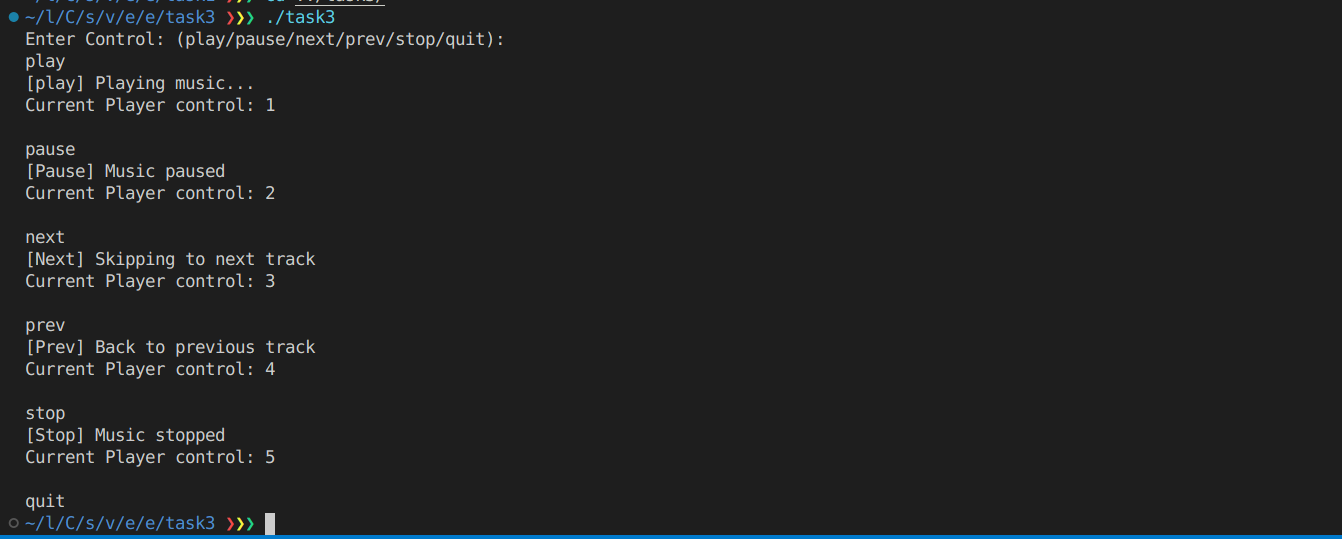

实验任务4
- 源码与运行测试截图
#ifndef FRACTION_H
#define FRACTION_H
#include <iostream>
#include <string>
class Fraction {
private:
int up;
int down;
void simplify();
public:
static const std::string doc;
Fraction(int numerator = 0, int denominator = 1);
Fraction(const Fraction& other);
int get_up() const;
int get_down() const;
Fraction negative() const;
};
namespace fracutil {
void output(const Fraction& f);
Fraction add(const Fraction& a, const Fraction& b);
Fraction sub(const Fraction& a, const Fraction& b);
Fraction mul(const Fraction& a, const Fraction& b);
Fraction div(const Fraction& a, const Fraction& b);
}
using fracutil::output;
using fracutil::add;
using fracutil::sub;
using fracutil::mul;
using fracutil::div;
#endif
#include "Fraction.h"
#include <numeric>
#include <stdexcept>
const std::string Fraction::doc =
"Fraction类 v0.01版.\n目前仅支持分数对象的构造、输出、加/减/乘/除运算.";
Fraction::Fraction(int numerator, int denominator)
: up(numerator), down(denominator) {
if (down == 0) {
throw std::invalid_argument("分母不能为0");
}
if (down < 0) {
up = -up;
down = -down;
}
simplify();
}
Fraction::Fraction(const Fraction& other)
: up(other.up), down(other.down) {}
int Fraction::get_up() const { return up; }
int Fraction::get_down() const { return down; }
Fraction Fraction::negative() const {
return Fraction(-up, down);
}
void Fraction::simplify() {
int g = std::gcd(up, down);
if (g != 0) {
up /= g;
down /= g;
}
}
namespace fracutil {
void output(const Fraction& f) {
std::cout << f.get_up() << "/" << f.get_down();
}
Fraction add(const Fraction& a, const Fraction& b) {
int numerator = a.get_up() * b.get_down() + b.get_up() * a.get_down();
int denominator = a.get_down() * b.get_down();
return Fraction(numerator, denominator);
}
Fraction sub(const Fraction& a, const Fraction& b) {
int numerator = a.get_up() * b.get_down() - b.get_up() * a.get_down();
int denominator = a.get_down() * b.get_down();
return Fraction(numerator, denominator);
}
Fraction mul(const Fraction& a, const Fraction& b) {
int numerator = a.get_up() * b.get_up();
int denominator = a.get_down() * b.get_down();
return Fraction(numerator, denominator);
}
Fraction div(const Fraction& a, const Fraction& b) {
if (b.get_up() == 0) {
throw std::invalid_argument("除数分数的分子为0,不能相除"); // 改成直接抛异常了
}
int numerator = a.get_up() * b.get_down();
int denominator = a.get_down() * b.get_up();
return Fraction(numerator, denominator);
}
}
#include "Fraction.h"
#include <iostream>
void test1();
void test2();
int main() {
std::cout << "����1: Fraction��������ܲ���\n";
test1();
std::cout << "\n����2: ��ĸΪ0����: \n";
test2();
}
void test1() {
using std::cout;
using std::endl;
cout << "Fraction�����: " << endl;
cout << Fraction::doc << endl << endl;
Fraction f1(5);
Fraction f2(3, -4), f3(-18, 12);
Fraction f4(f3);
cout << "f1 = "; output(f1); cout << endl;
cout << "f2 = "; output(f2); cout << endl;
cout << "f3 = "; output(f3); cout << endl;
cout << "f4 = "; output(f4); cout << endl;
const Fraction f5(f4.negative());
cout << "f5 = "; output(f5); cout << endl;
cout << "f5.get_up() = " << f5.get_up()
<< ", f5.get_down() = " << f5.get_down() << endl;
cout << "f1 + f2 = "; output(add(f1, f2)); cout << endl;
cout << "f1 - f2 = "; output(sub(f1, f2)); cout << endl;
cout << "f1 * f2 = "; output(mul(f1, f2)); cout << endl;
cout << "f1 / f2 = "; output(div(f1, f2)); cout << endl;
cout << "f4 + f5 = "; output(add(f4, f5)); cout << endl;
}
void test2() {
using std::cout;
using std::endl;
Fraction f6(42, 55), f7(0, 3);
cout << "f6 = "; output(f6); cout << endl;
cout << "f7 = "; output(f7); cout << endl;
cout << "f6 / f7 = "; output(div(f6, f7)); cout << endl;
}
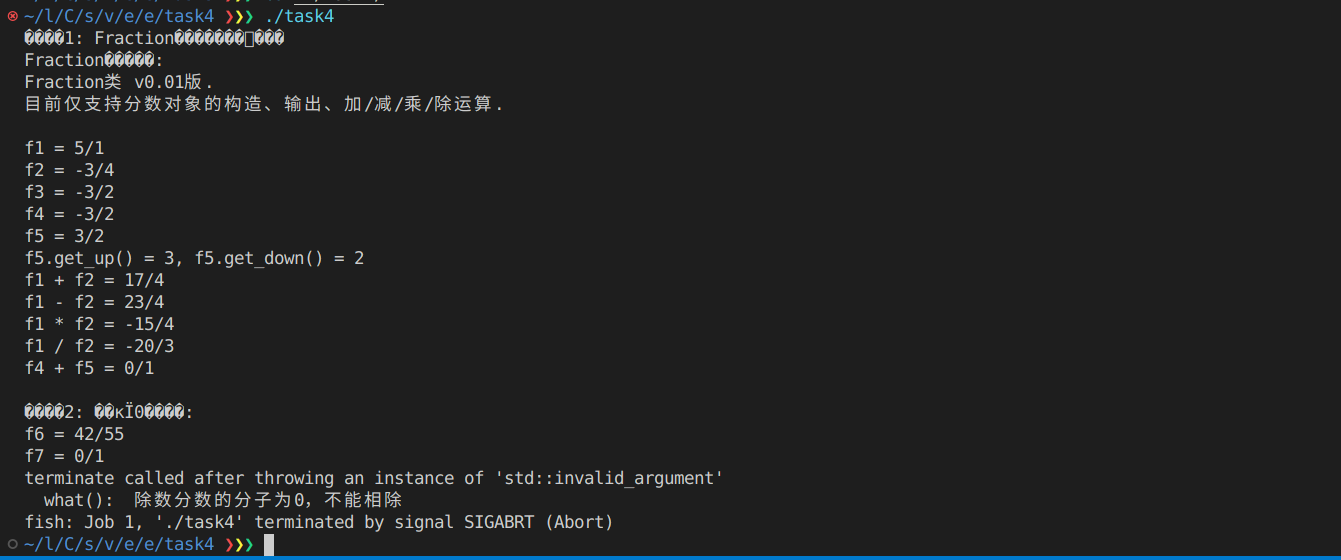
- 问题
- 如果要用运算符的话就用友元函数,如果要模块化就命名空间+自由函数
- 友元函数会破坏封装,滥用会导致类与函数的耦合度上升
五、实验结论
实验任务1
- 关于友元函数
func- 如果在
T.h中去掉friend void func();的声明,程序无法通过编译。 - 原因:
func需要访问T的私有成员m2,没有友元声明时无法访问私有数据,会导致编译报错。
- 如果在
- 构造函数与析构函数
- 普通构造函数:用于对象创建时的初始化。
- 复制构造函数:用于通过已有对象创建新对象时调用。
- 移动构造函数:用于使用
std::move或右值生成对象时调用,减少不必要的拷贝。 - 析构函数:对象生命周期结束时自动调用,用于资源释放(RAII)。
- 静态成员与链接问题
- 静态成员变量只能在一个
.cpp文件中定义一次。 - 头文件中初始化静态成员会导致被多次包含,从而出现
multiple definition链接错误。 - 正确做法:在
.h中声明,在.cpp中定义。
- 静态成员变量只能在一个
实验任务2
-
自定义类
Complex与标准库std::complex对比- 标准库
std::complex的语法更简洁,自然支持运算符重载。 - 函数和运算内部有关联,标准库通过重载操作符实现。
- 标准库
-
关于友元函数
- 自定义类中
output/abs/add等函数并不一定需要访问私有数据,可以通过公共接口实现,但使用友元可简化代码。 std::complex并未将abs设为友元,而是提供了公共访问接口。- 使用友元函数的时机:当函数实现需要访问类的私有成员,且该函数逻辑属于类相关操作时。
- 自定义类中
-
禁止
=拷贝构造-
如果构造对象时禁用
Complex c4 = c2;的形式,可通过删除拷贝构造函数或赋值运算符:Complex(const Complex&) = delete; Complex& operator=(const Complex&) = delete;
-
实验任务3
- PlayerControl 功能
- 利用枚举
ControlType管理播放控制命令。 parse函数将字符串映射为ControlType并计数。execute函数根据命令执行输出操作。
- 利用枚举
实验任务4
- 分数运算设计方案
- 选择 命名空间 + 自由函数 方案:
- 保持封装性,不破坏类私有成员。
- 适合模块化设计,便于扩展。
- 友元函数方案在需要运算符重载或直接访问私有数据时可使用,但滥用会增加耦合。
- 静态成员函数方案适用于工具类函数,不适合自然表达算术运算符语义。
- 选择 命名空间 + 自由函数 方案:
- 总结
- 对于小型数值类(如 Fraction、Complex),友元函数可提高代码简洁性与表达性。
- 对于库或模块化设计,推荐使用命名空间+自由函数,保持封装和可扩展性。
六、实验总结
- 深入了解了不同场景下对于类的不同功能的实现方案的取舍方式
- 复习了一些类设计的细节
- 题外话
- 关于多文件,直接提供参数编译了,正常情况下应该使用cmake或者直接使用makefile
- 关于输出乱码,结论是gbk文件的压缩包在解压的时候需要提供参数帮助
unar进行解压,否则会损失信息(诸如7z和unzip这类的解压工具不具备这种能力)
解压出来的文件在编辑器中打开时也要设置解码格式为gbk。但考虑到只影响注释和output format就不处理了
参考资料
cppreference, chatgpt



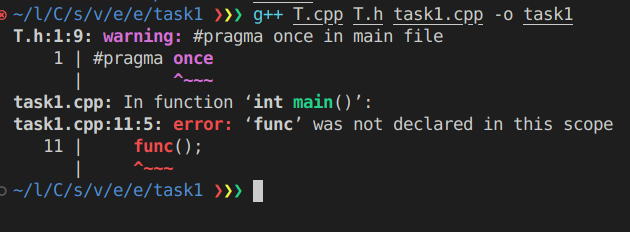


 浙公网安备 33010602011771号
浙公网安备 33010602011771号